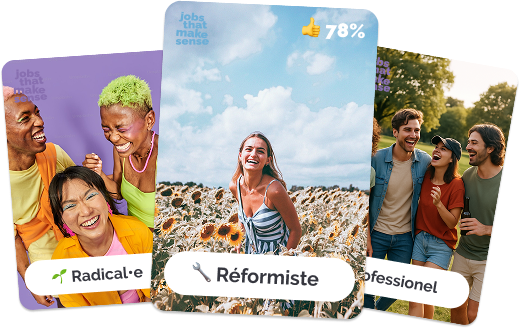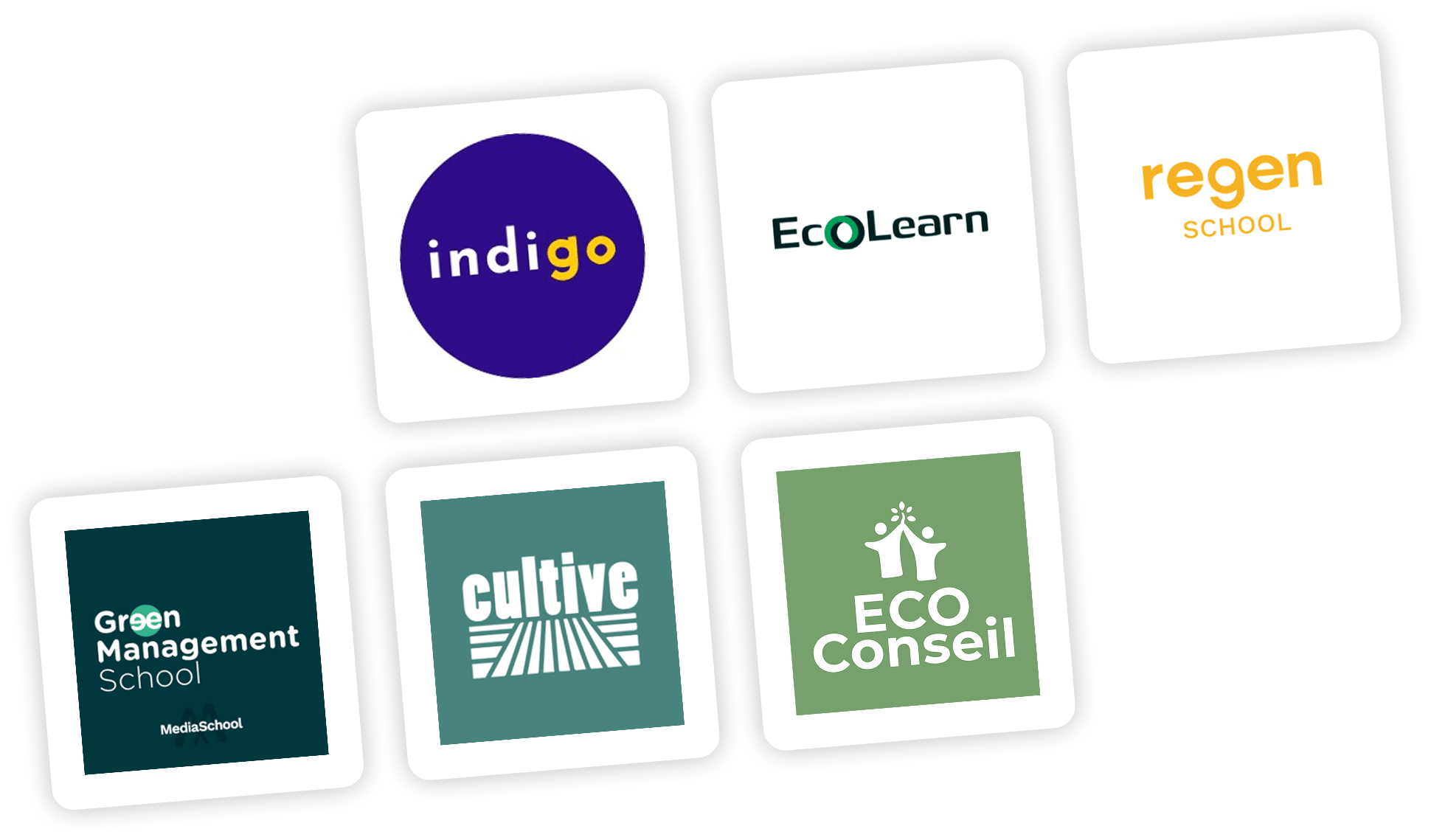Martin - Low-tech association manager and part-time employee
"As an individual, I tend to revolt easily when I'm faced with injustice, and the climate issue is a huge injustice." After engineering school, Martin began working in the automotive sector. He soon found himself in dissonance with his job and decided to "switch"first, then a second time. Soon enough, he became interested in the world of low tech and launched an associative project in this sector in March 2021. He tells us about his journey...
What is low tech?
Making your own windmills, pedaling to create energy, preserving products through lacto-fermentation... Low tech is an approach that aims to meet essential human needs in the simplest possible way. Martin explains that it is based on 3 pillars: usefulness, accessibility and sustainability. Usefulness means meeting essential needs. Accessibility means being able to appropriate simple techniques and pass them on. Sustainability means using local resources and considering the product's life cycle. Finally, the low-tech approach aims to reflect on the global social project behind the launch of a product: on the scale of a neighborhood, a city, a region.
First rocker
Before starting his studies, Martin didn't see himself as an engineer. He took a DUT in electronic, computer and industrial engineering in Montpellier, followed by a bachelor's degree in electricity. "I have a geek profile and I want to understand how the things I use every day work. And that's a starting point for everything else." After the bachelor's degree, he finally joined an engineering school at UTBM (Belfort Montbéliard University of Technology), with a curriculum in electronics and embedded systems. But he already senses the first dissonances..."We were trained to make electric cars and renewable energy systems. Even then, I didn't think it was coherent, because we were sticking to the model of individual cars.I didn't see it as a solution for the future." The careers he was offered after school also seemed little coherent with ecological and social issues. "I did an internship in the automotive industry, because that's where my degree was taking me. Then at the leading automotive supplier, Bosch Engineering, for 7 months in Germany." "I was working on Park Assist systems, and I felt that all the money we were putting into it was of no interest compared to the issues we'd already had for some thirty years. We were very well paid, but for me it was important to be consistent with my values. Otherwise I was unhappy. That was the first turning point: saying no to comfort, money and everything that went with it.
"We were very well paid, but for me it was important to be consistent with my values. Otherwise I was unhappy."
"I've started to develop a critical mind about my job".
After turning that first page, Martin moved to Nantes with his partner in 2015. He then applied for start-ups and small businesses. "I was taken on by a startup in home automation, I could already see more sense. However, I wasn't selected after the trial period." The blow was hard to take for Martin, who entered a period of unemployment. However, he takes advantage of this break to take an interest in more committed structures, particularly the low tech approach."The low tech lab had just been co-founded in Concarneau in 2014." Co-founder Corentin de Chatelperron was his inspiration. In 2010, this former engineer founded a committed project: the Jute Lab in Bangladesh, to test the use of jute fiber. "This local resource was used to build boat hulls." In addition to this discovery, Martin began to develop a critical mind about his profession: "I began to question technology as the answer to all our needs. I also read Philippe Bihouix's book: l'âge des low-tech, and then philosophy, which helped me ask myself some questions."
A Working Holiday Permit in Canada
During his period of unemployment, he also decided to go off on his own for 1 year, to Canada. "I did a lot of wwoofing, I discovered another culture by living with Canadian families. It was also over there that I began to hone my low-tech side." After these experiences, for him, returning to France meant: doing a job that made sense.
"You no longer feel out of step because people are thinking the same thing as you."
A Hackathon
On his return to France, he stayed in action and organized a low tech hackathon in Rennes. All the co-founders of the low tech lab and the people who gravitate around the low tech project were present. "It lasted 2 days and the idea was to work on the wind turbine and solar oven, following a tutorial. You had to be able, as a group, to recreate these objects in a weekend, and have a critical eye on the tutorials to improve them." What made the experience all the more enjoyable was the feeling of being surrounded by people as passionate about these subjects as he was. "For the space of a weekend, you no longer feel out of step because people are thinking the same thing as you," explains Martin..
"I put my skills to work for Ifremer for 5 years".
He then applied for and was recruited by Ifremer (the French Research Institute for Exploitation of the Sea) in Brest. His job involves working on temperature and salinity measurements in all the world's oceans. "In this position, I felt I had reached the pinnacle of what I could do as an engineer: participate in research, work on climate issues, as the beacons measure the impacts of global warming on the oceans." Being accepted for this position is a great opportunity, on which he focuses, leaving low tech and its more militant side to one side. At least for a while... "I put my skills at the service of Ifremer for 5 years. What I take away from this career path is that even in big companies, you can have teams in which you flourish, but these things are temporary." Team changes, making the work less stimulating, and realizing how little impact he was having in his job, led him to burn out. "I sought support by going to see a psychologist. Then I negotiated a contractual severance and left."
The Low Tech Lab association in Brest
Thanks to a break conventionnelle obtained, which enabled him to collect unemployment, this time, he launched himself and founded the low tech association in Brest. "The 3 of us co-created the association, Hugo, who works in the company where I also work, and Mathieu, an employee at Naval Group." Since 2019, a community program has been helping local players set up local low tech communities. This tool gives him confidence and enables him to create his association. For the past years, "The project has taken off well in Brest"Martin is satisfied. On the other hand, he points out that he put "a completely delirious amount of energy into it." Looking back, he knows that his mistake may have been wanting to do a lot and fast."When you embark on a group project, you have to accept the inertia of a collective project, otherwise you carry everything on your shoulders. That's what happened to me."
Half-time to regain balance
Former colleagues can be invaluable... A former Ifremer subcontractor, having launched his own company in 2022, offers Martin a job. At first, Martin refuses the low-tech project. But when he comes back to him in 2023 to offer him a part-time position, Martin accepts. "I consider that I don't have the capacity to raise enough money to manage the association, and in discussion with the people in the association, we agreed to be volunteers." The company, which he joins on a part-time basis, remains in line with his values, since it has created a dolphin repellent to prevent accidental fishing. The company also has an interest in hiring Martin, who is working internally on putting the low-tech approach into practice in a professional setting, around the issue of waste, setting up a fleet of electric bikes, cargo bikes, to be shared between employees of the company, the crèche and the red cross (which are in the same building)."At a time when employees are looking for committed companies, it's doubly interesting for my employer to take action and stand out from competitors" points out Martin.
Being a dad and seeing the world differently
A final word from Martin is about his responsibilities, as a dad of 5 years. "When you're a parent, you no longer function solely for yourself or for your couple. On the one hand, it takes time. But you have a sick responsibility in terms of what you leave as a legacy." If the path hasn't always been easy, taking action in his daily life and in his work, is for him a duty towards this human being he brought into the world."I can't see myself in 10 or 20 years, facing my child and saying: I didn't do anything, I didn't dare, I was waiting for a political decision. It's not possible." He adds that in his "commitment, there's a balance to be found", well aware that taking risks can also have an impact on his child.
5 tips from Martin
#1 Ask yourself some questions;
As soon as you start asking yourself questions, you're already on the right track. Then you have to ask yourself what you're going to do with these questions, and what you're going to do to answer them;
#2 Free up time
To nourish myself intellectually speaking and get involved in more militant actions. The good thing about being an engineer is that we earn very comfortable salaries. If you work 20% less, you're still very comfortable.
#3 Commitment
In associations, or by starting to propose things in your company.
#4 Cultivate your personality
Working on yourself and getting to know yourself is very important. Once you're consistent with yourself, your actions will be more coherent. What's more, it's easier to attract people who are aligned with your values;
#5 Experimenting with things
Don't be afraid of the unknown. As soon as you take action, things will unblock themselves.
Find out more about the low-tech approach
👉Film builders of the next world
Taking action
👉 Find all job offers, testimonials, training and inspiring articles on ingesdavenir.org
👉 Find a job with a positive impact
👉 Training for jobs in the ecological and social transition
Further information
👉 Olivier Lefebvre - "il est difficile de sortir de sa cage dorée"
👉 Bastien, future engineer - "I can't see myself saying I've done nothing"



